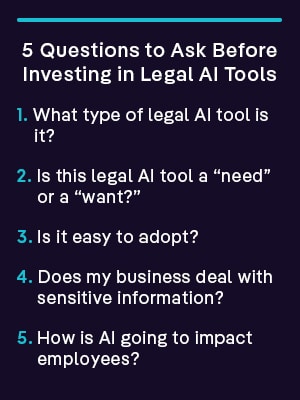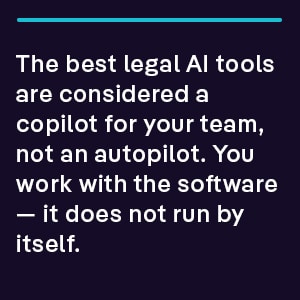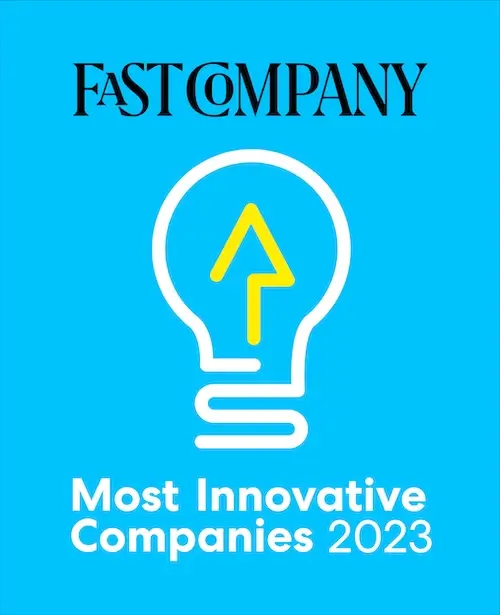With Generative AI driving a boom, the market seems to be flooded with legal technology. Each new tool boasts of its value — some may even sound perfect to solve your business issues — but is it time to adopt one of these tools? Are any of these useful (for legal, at least)? Here are five things to keep in mind when considering these tools:
1. What type of legal AI tool is it (and is it permitted where my team is located)?
There are no universal rules for every single type of AI. This may vary according to individual countries, states, and enterprises. Most notably, Italy temporarily banned the generative AI chatbot, ChatGPT, in April of 2023, and over 1,100 parties signed a “commitment” to pause all AI development for at least 6 months.
However, multiple types of AI have been used in varying industries for many years prior to now. Digital voice assistants, like Alexa and Siri, use artificial intelligence to operate better over time. And they’re not the only ones – from applications that help you create presentations quickly to machine learning that optimizes your social media feed, these algorithms have assisted in much of our modern, everyday lives. These types of AI are unlikely to be blanket-banned, but the tool that is catching your eye should be well-researched before purchasing.
2. Is this legal AI tool a “need” or a “want?”
The news hype behind these AI tools may cause more interest in technology adoption within your company. When seeing competitors using new innovations, you might experience some FOMO, possibly even falling behind in your sector. But is early adoption worth it?
Ask yourself: What problem are we planning to solve by purchasing this tool? Are we purchasing for the sake of purchasing, or does this fit into our business planning? Great solutions and tools continue contributing value to your company long after adopting them; purchases borne of impulsivity or FOMO are not likely to be such tools—pick them because they make your teams better, not simply because a competitor says “we have AI.”
Additionally, according to our recent survey, the fastest adopters of contracting technology are teams within the IT and software development sector or in the APAC region, whereas the slowest adopters came from the insurance sector or European region. It is important to not merely follow the hype, even if your region or sector is known for quick adoption. Research tools that would cater to your specific needs, instead of assuming that one tool would be a blanket solution for you since your competitor uses it. Rather, ask whether there would be tangible benefits to your company. Proceed with caution with your research, focusing on the benefit that you prioritize the highest, so that you can measure immediate value thus lowering possible adoption fatigue, which leads to the next question…
3. Is it easy to adopt?
When you dove into a demo with the product you like, consider if it was easy for you to figure it out without help. Since you are the person pushing for adoption, you are the most likely to have the most patience towards this new tool. If the AI is trying even your patience, it may not be the best solution for your business. Even the best tool on the market will not have as big of an impact if adoption within the enterprise is low.
On the other hand, the adoption of new technology may increase your legal team’s retention. When we surveyed multiple industries, in the insurance sector, 73.3% surveyed have seen a somewhat or significant increase in legal retention during the past 2 years, with 36.7% attributing this rise to new technology. Therefore, the right contracting tool would not only improve team efficiencies when it comes to organizational governance and streamlined workflows, but also help you retain your experienced talent.
Find the threshold for adoption within your company – tools that make your team’s work easier are more likely to be used and have its value fully actualized.
4. Does my business deal with sensitive information?
Enterprises involved with proprietary innovations, client information, or industry secrets should be especially mindful of technology that is “open-sourced.” Even though some AI solutions are securely housed and heavily encrypted, it is imperative to ensure that the legal tech tool you research, and adopt, also utilize extensive guardrails to prevent misuse and abuse of the tools and discourage hacking. Ideally, the solution you select is forthright and forthcoming about their AI framework functionality and their security practices to make sure they meet your needs.
Adopting innovative tools can give your firm an edge over the competition, but it should not be at the expense of your security. With legal teams regularly handling sensitive information, consider paid versions over free AI options, as they tend to have stronger security procedures in place.
5. How is AI going to impact employees?
Especially with innovative technologies, there is a temptation to ignore the “small” issues. Even the best tools created by established companies (with ample funding) would still have possible issues or bugs when using them. Particularly with legal AI, oversight is required. Though incredibly powerful and useful in your team’s work efficiency, the best legal AI tools are considered a copilot for your team, not an autopilot. You work with the software — it does not run by itself.
In fact, due to AI fallacies, such as ‘fact hallucinating’ and bias, all outputs should be carefully reviewed. Not unlike hiring a brilliant, yet inexperienced, intern for your law firm, much of what they churn out may be quality outputs, but even the smallest errors can cause a large impact, given the nature of legal. Teams would need someone who knows the subject matter not just well, but expertly, and who can pick up on the factual inconsistencies. A team member should monitor all the projects your AI tool touches. This is particularly relevant for generative AI tools, which, while powerful, still have such flaws when out-of-box, as evident in the increased employment of prompt engineers and writers. These workers not only check AI tools for these types of issues but ensure that they function correctly.
Therefore, no matter how powerful legal AI tools have become, they should still be seen as only an instrument, not a worker replacement.
Want to see how ContractPodAi uses AI? Meet Leah, our AI legal assistant.










